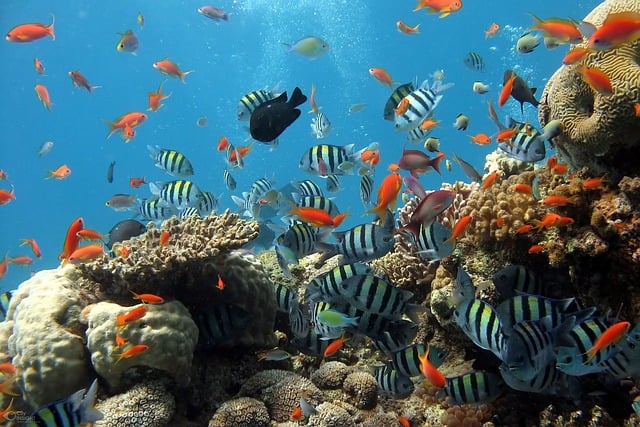Listen&Learn: Ocean acidification
Posted by: Jaksyn PeacockPre-listening vocabulary
- ecosystem: a community of living creatures that depend on each other
- carbon dioxide: a gas that is released into the air by the use of oil and coal
- balance: a healthy or even amount of different things
- dissolve: to mix with a liquid
- greenhouse effect: the process where gases in a planet’s atmosphere trap heat
- molecule: a combination of bonded atoms
- shell: a hard outer layer that surrounds an animal
Listening activity
Podcast: Play in new window | Download (Duration: 1:13 — 1.1MB)
Subscribe: Apple Podcasts | Google Podcasts | RSS | More
Gapfill exercise
Comprehension questions
See answers below
- The pH level of the oceans is
a. increasing
b. decreasing
c. fluctuating rapidly - Ocean acidification is caused by
a. plastic pollution
b. fertilizer runoff
c. dissolved carbon dioxide - Carbonic acid
a. makes seawater poisonous to fish and whales
b. makes seafood dangerous for humans to eat
c. destroys the shells of clams, plankton, and coral
Discussion/essay questions
- Do you think humans will be able to stop ocean acidification and climate change? What are some actions that people can take to help the environment?
Transcript
Ocean acidification is a dangerous environmental process. Over time, the pH level of the oceans is decreasing, which is likely to lead to the disruption of ecosystems and the endangerment of marine life. Like climate change, ocean acidification is caused by human activity. Excess carbon dioxide emissions disrupt the chemical balances of the Earth. While some carbon dioxide stays in the atmosphere, causing a greenhouse effect, some dissolves in the ocean. Carbon dioxide molecules bond with water molecules to make carbonic acid, which can destroy the shells of marine animals like clams, coral, and plankton. The loss of these creatures would cause major consequences for underwater ecosystems, and for human life, too.
Answers to comprehension questions
1b 2c 3c
Search for more Listen&Learn stories:
Subscribe to EnglishClub Podcasts
One comment
-
Joseph GLON says:
Humanity is at the beginning of a big task. Restore the atmospherique situation. Is each world citizens aware of this dramatic situation. Each of us have have to think and act immediately. Have a good day and a wink from France 😉
